Management and Organizational Behavior: A Comprehensive Essay
VerifiedAdded on 2020/02/19
|8
|2151
|81
Essay
AI Summary
This essay provides a comprehensive analysis of organizational behavior, focusing on the application of various theories within a business environment. It examines how employee attitudes, job satisfaction, and organizational commitment significantly impact workplace dynamics and overall productivity. The essay delves into the categorization of individual attitudes and behaviors, including utilitarian attitudes, rationalizing, and the impact of ego protection. It emphasizes the importance of managerial awareness of employee values, the influence of attitudes on behavior, and the role of job satisfaction and a positive work environment in reinforcing desired behaviors. The essay also explores the concepts of job satisfaction, its components (emotional, cognitive, and behavioral), and the common myths surrounding it. Furthermore, it highlights the significance of organizational commitment, its correlation with employee behavior, and its role in fostering a competitive advantage. The essay concludes by stressing the importance of managerial attention to job satisfaction and organizational commitment to ensure employee motivation, productivity, and the overall success of the organization.
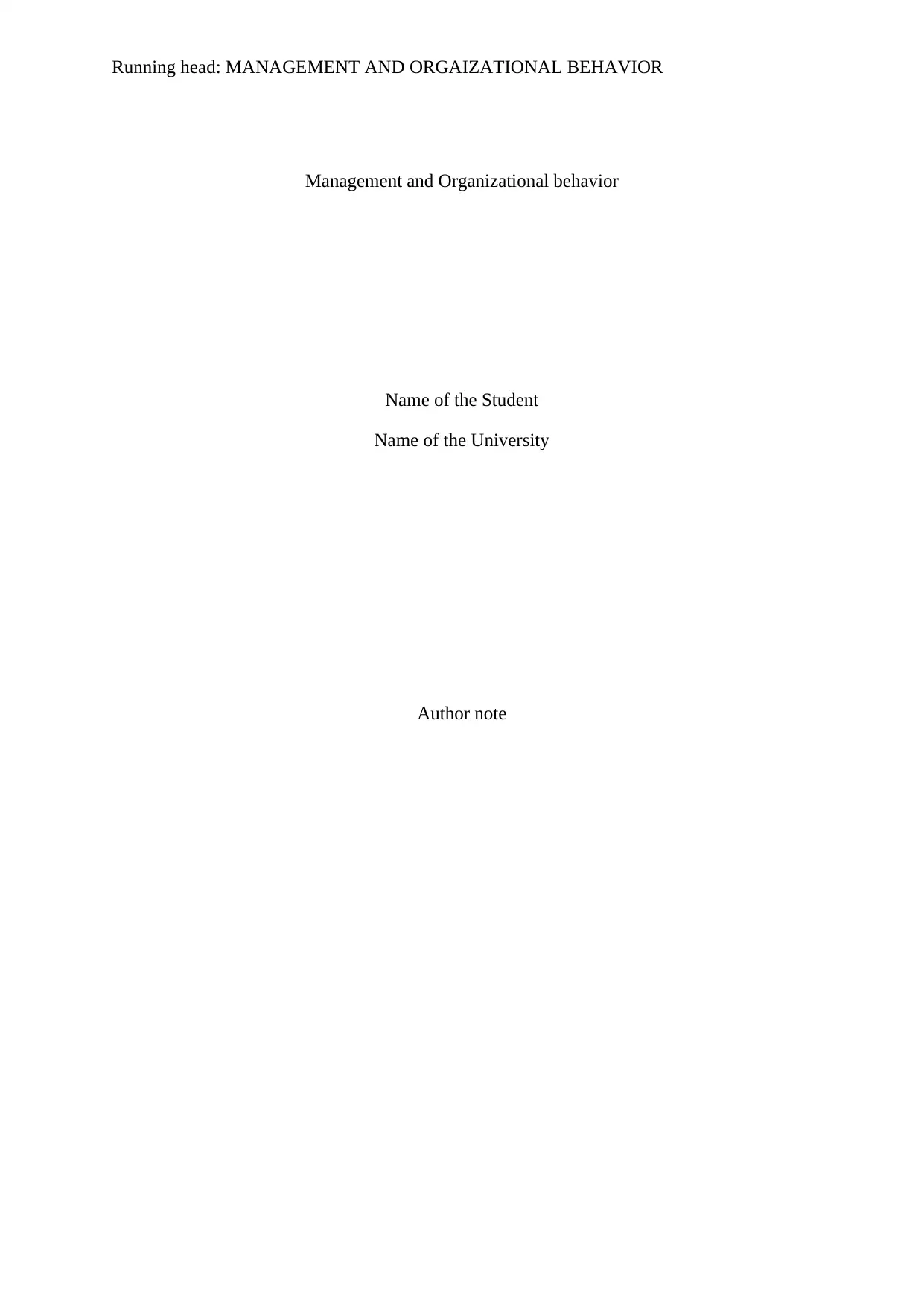
Running head: MANAGEMENT AND ORGAIZATIONAL BEHAVIOR
Management and Organizational behavior
Name of the Student
Name of the University
Author note
Management and Organizational behavior
Name of the Student
Name of the University
Author note
Paraphrase This Document
Need a fresh take? Get an instant paraphrase of this document with our AI Paraphraser
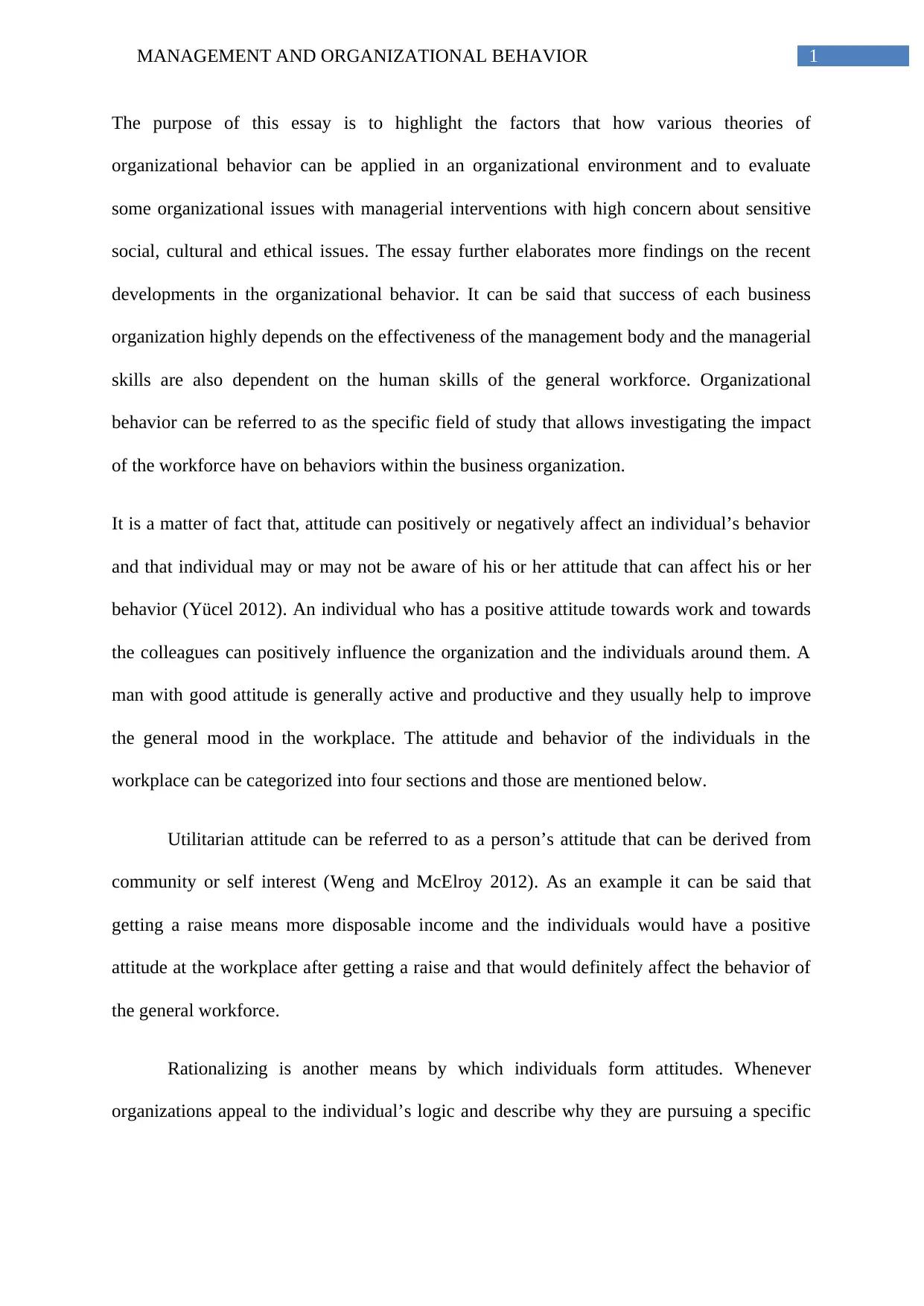
1MANAGEMENT AND ORGANIZATIONAL BEHAVIOR
The purpose of this essay is to highlight the factors that how various theories of
organizational behavior can be applied in an organizational environment and to evaluate
some organizational issues with managerial interventions with high concern about sensitive
social, cultural and ethical issues. The essay further elaborates more findings on the recent
developments in the organizational behavior. It can be said that success of each business
organization highly depends on the effectiveness of the management body and the managerial
skills are also dependent on the human skills of the general workforce. Organizational
behavior can be referred to as the specific field of study that allows investigating the impact
of the workforce have on behaviors within the business organization.
It is a matter of fact that, attitude can positively or negatively affect an individual’s behavior
and that individual may or may not be aware of his or her attitude that can affect his or her
behavior (Yücel 2012). An individual who has a positive attitude towards work and towards
the colleagues can positively influence the organization and the individuals around them. A
man with good attitude is generally active and productive and they usually help to improve
the general mood in the workplace. The attitude and behavior of the individuals in the
workplace can be categorized into four sections and those are mentioned below.
Utilitarian attitude can be referred to as a person’s attitude that can be derived from
community or self interest (Weng and McElroy 2012). As an example it can be said that
getting a raise means more disposable income and the individuals would have a positive
attitude at the workplace after getting a raise and that would definitely affect the behavior of
the general workforce.
Rationalizing is another means by which individuals form attitudes. Whenever
organizations appeal to the individual’s logic and describe why they are pursuing a specific
The purpose of this essay is to highlight the factors that how various theories of
organizational behavior can be applied in an organizational environment and to evaluate
some organizational issues with managerial interventions with high concern about sensitive
social, cultural and ethical issues. The essay further elaborates more findings on the recent
developments in the organizational behavior. It can be said that success of each business
organization highly depends on the effectiveness of the management body and the managerial
skills are also dependent on the human skills of the general workforce. Organizational
behavior can be referred to as the specific field of study that allows investigating the impact
of the workforce have on behaviors within the business organization.
It is a matter of fact that, attitude can positively or negatively affect an individual’s behavior
and that individual may or may not be aware of his or her attitude that can affect his or her
behavior (Yücel 2012). An individual who has a positive attitude towards work and towards
the colleagues can positively influence the organization and the individuals around them. A
man with good attitude is generally active and productive and they usually help to improve
the general mood in the workplace. The attitude and behavior of the individuals in the
workplace can be categorized into four sections and those are mentioned below.
Utilitarian attitude can be referred to as a person’s attitude that can be derived from
community or self interest (Weng and McElroy 2012). As an example it can be said that
getting a raise means more disposable income and the individuals would have a positive
attitude at the workplace after getting a raise and that would definitely affect the behavior of
the general workforce.
Rationalizing is another means by which individuals form attitudes. Whenever
organizations appeal to the individual’s logic and describe why they are pursuing a specific
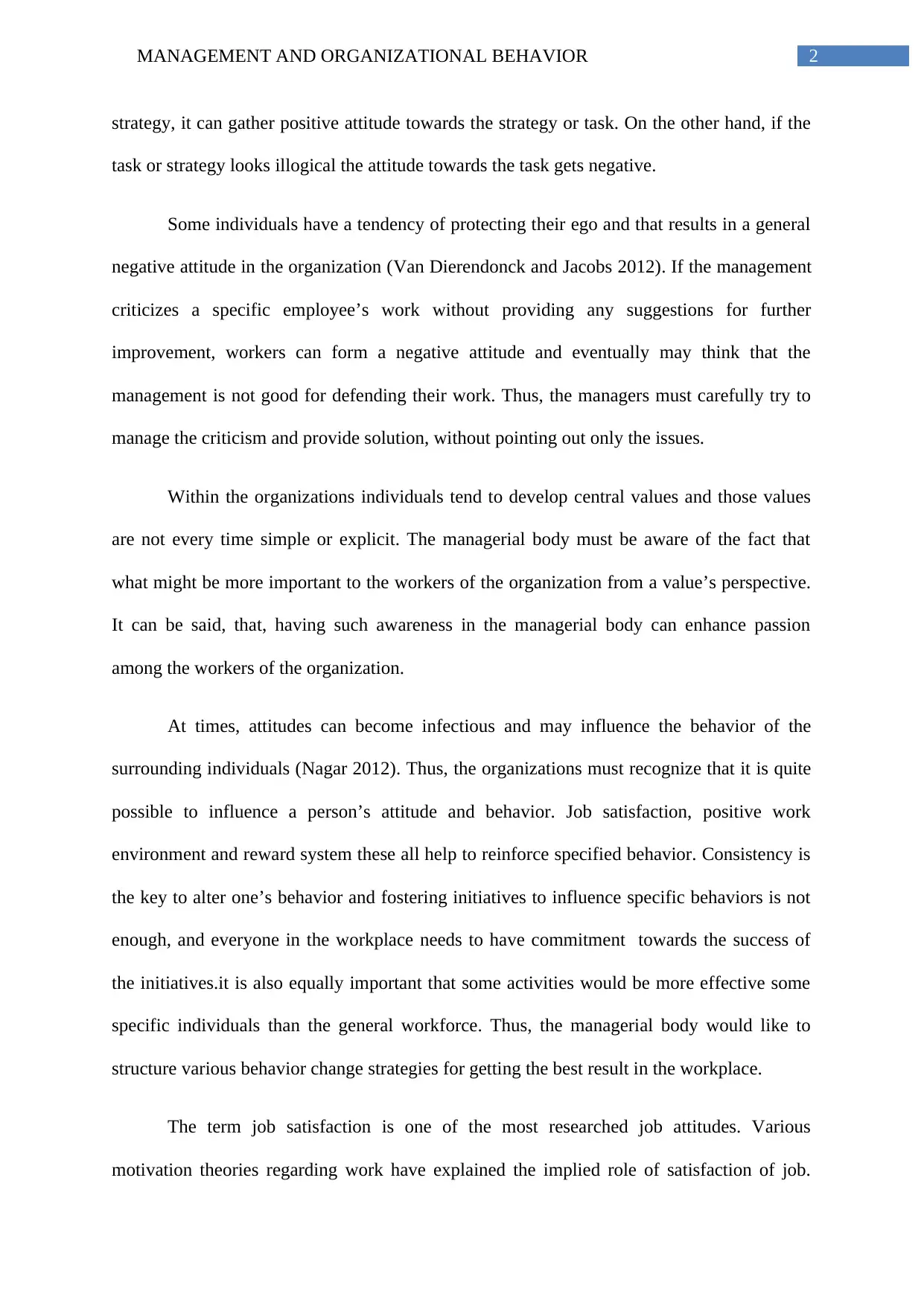
2MANAGEMENT AND ORGANIZATIONAL BEHAVIOR
strategy, it can gather positive attitude towards the strategy or task. On the other hand, if the
task or strategy looks illogical the attitude towards the task gets negative.
Some individuals have a tendency of protecting their ego and that results in a general
negative attitude in the organization (Van Dierendonck and Jacobs 2012). If the management
criticizes a specific employee’s work without providing any suggestions for further
improvement, workers can form a negative attitude and eventually may think that the
management is not good for defending their work. Thus, the managers must carefully try to
manage the criticism and provide solution, without pointing out only the issues.
Within the organizations individuals tend to develop central values and those values
are not every time simple or explicit. The managerial body must be aware of the fact that
what might be more important to the workers of the organization from a value’s perspective.
It can be said, that, having such awareness in the managerial body can enhance passion
among the workers of the organization.
At times, attitudes can become infectious and may influence the behavior of the
surrounding individuals (Nagar 2012). Thus, the organizations must recognize that it is quite
possible to influence a person’s attitude and behavior. Job satisfaction, positive work
environment and reward system these all help to reinforce specified behavior. Consistency is
the key to alter one’s behavior and fostering initiatives to influence specific behaviors is not
enough, and everyone in the workplace needs to have commitment towards the success of
the initiatives.it is also equally important that some activities would be more effective some
specific individuals than the general workforce. Thus, the managerial body would like to
structure various behavior change strategies for getting the best result in the workplace.
The term job satisfaction is one of the most researched job attitudes. Various
motivation theories regarding work have explained the implied role of satisfaction of job.
strategy, it can gather positive attitude towards the strategy or task. On the other hand, if the
task or strategy looks illogical the attitude towards the task gets negative.
Some individuals have a tendency of protecting their ego and that results in a general
negative attitude in the organization (Van Dierendonck and Jacobs 2012). If the management
criticizes a specific employee’s work without providing any suggestions for further
improvement, workers can form a negative attitude and eventually may think that the
management is not good for defending their work. Thus, the managers must carefully try to
manage the criticism and provide solution, without pointing out only the issues.
Within the organizations individuals tend to develop central values and those values
are not every time simple or explicit. The managerial body must be aware of the fact that
what might be more important to the workers of the organization from a value’s perspective.
It can be said, that, having such awareness in the managerial body can enhance passion
among the workers of the organization.
At times, attitudes can become infectious and may influence the behavior of the
surrounding individuals (Nagar 2012). Thus, the organizations must recognize that it is quite
possible to influence a person’s attitude and behavior. Job satisfaction, positive work
environment and reward system these all help to reinforce specified behavior. Consistency is
the key to alter one’s behavior and fostering initiatives to influence specific behaviors is not
enough, and everyone in the workplace needs to have commitment towards the success of
the initiatives.it is also equally important that some activities would be more effective some
specific individuals than the general workforce. Thus, the managerial body would like to
structure various behavior change strategies for getting the best result in the workplace.
The term job satisfaction is one of the most researched job attitudes. Various
motivation theories regarding work have explained the implied role of satisfaction of job.
⊘ This is a preview!⊘
Do you want full access?
Subscribe today to unlock all pages.

Trusted by 1+ million students worldwide
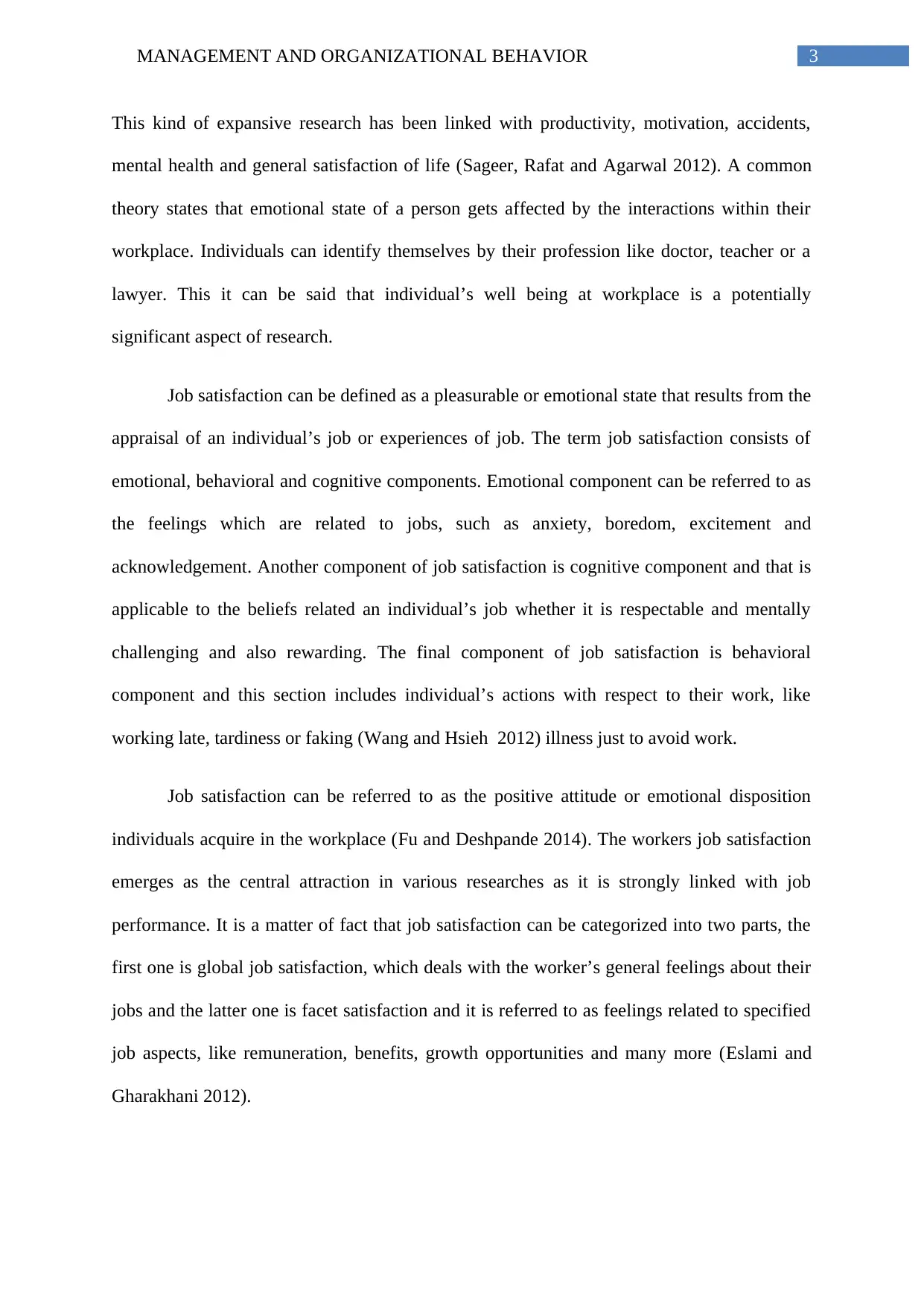
3MANAGEMENT AND ORGANIZATIONAL BEHAVIOR
This kind of expansive research has been linked with productivity, motivation, accidents,
mental health and general satisfaction of life (Sageer, Rafat and Agarwal 2012). A common
theory states that emotional state of a person gets affected by the interactions within their
workplace. Individuals can identify themselves by their profession like doctor, teacher or a
lawyer. This it can be said that individual’s well being at workplace is a potentially
significant aspect of research.
Job satisfaction can be defined as a pleasurable or emotional state that results from the
appraisal of an individual’s job or experiences of job. The term job satisfaction consists of
emotional, behavioral and cognitive components. Emotional component can be referred to as
the feelings which are related to jobs, such as anxiety, boredom, excitement and
acknowledgement. Another component of job satisfaction is cognitive component and that is
applicable to the beliefs related an individual’s job whether it is respectable and mentally
challenging and also rewarding. The final component of job satisfaction is behavioral
component and this section includes individual’s actions with respect to their work, like
working late, tardiness or faking (Wang and Hsieh 2012) illness just to avoid work.
Job satisfaction can be referred to as the positive attitude or emotional disposition
individuals acquire in the workplace (Fu and Deshpande 2014). The workers job satisfaction
emerges as the central attraction in various researches as it is strongly linked with job
performance. It is a matter of fact that job satisfaction can be categorized into two parts, the
first one is global job satisfaction, which deals with the worker’s general feelings about their
jobs and the latter one is facet satisfaction and it is referred to as feelings related to specified
job aspects, like remuneration, benefits, growth opportunities and many more (Eslami and
Gharakhani 2012).
This kind of expansive research has been linked with productivity, motivation, accidents,
mental health and general satisfaction of life (Sageer, Rafat and Agarwal 2012). A common
theory states that emotional state of a person gets affected by the interactions within their
workplace. Individuals can identify themselves by their profession like doctor, teacher or a
lawyer. This it can be said that individual’s well being at workplace is a potentially
significant aspect of research.
Job satisfaction can be defined as a pleasurable or emotional state that results from the
appraisal of an individual’s job or experiences of job. The term job satisfaction consists of
emotional, behavioral and cognitive components. Emotional component can be referred to as
the feelings which are related to jobs, such as anxiety, boredom, excitement and
acknowledgement. Another component of job satisfaction is cognitive component and that is
applicable to the beliefs related an individual’s job whether it is respectable and mentally
challenging and also rewarding. The final component of job satisfaction is behavioral
component and this section includes individual’s actions with respect to their work, like
working late, tardiness or faking (Wang and Hsieh 2012) illness just to avoid work.
Job satisfaction can be referred to as the positive attitude or emotional disposition
individuals acquire in the workplace (Fu and Deshpande 2014). The workers job satisfaction
emerges as the central attraction in various researches as it is strongly linked with job
performance. It is a matter of fact that job satisfaction can be categorized into two parts, the
first one is global job satisfaction, which deals with the worker’s general feelings about their
jobs and the latter one is facet satisfaction and it is referred to as feelings related to specified
job aspects, like remuneration, benefits, growth opportunities and many more (Eslami and
Gharakhani 2012).
Paraphrase This Document
Need a fresh take? Get an instant paraphrase of this document with our AI Paraphraser
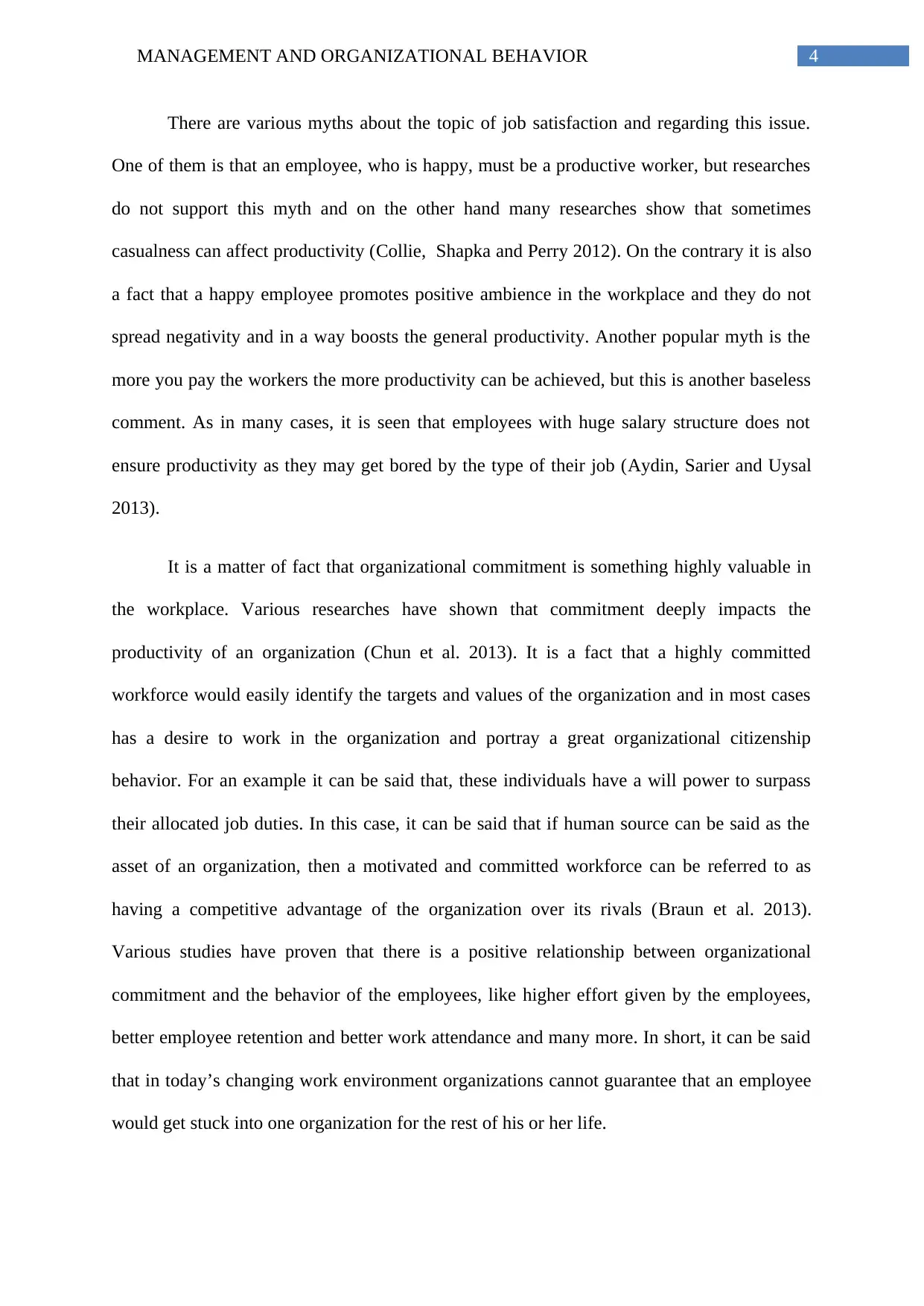
4MANAGEMENT AND ORGANIZATIONAL BEHAVIOR
There are various myths about the topic of job satisfaction and regarding this issue.
One of them is that an employee, who is happy, must be a productive worker, but researches
do not support this myth and on the other hand many researches show that sometimes
casualness can affect productivity (Collie, Shapka and Perry 2012). On the contrary it is also
a fact that a happy employee promotes positive ambience in the workplace and they do not
spread negativity and in a way boosts the general productivity. Another popular myth is the
more you pay the workers the more productivity can be achieved, but this is another baseless
comment. As in many cases, it is seen that employees with huge salary structure does not
ensure productivity as they may get bored by the type of their job (Aydin, Sarier and Uysal
2013).
It is a matter of fact that organizational commitment is something highly valuable in
the workplace. Various researches have shown that commitment deeply impacts the
productivity of an organization (Chun et al. 2013). It is a fact that a highly committed
workforce would easily identify the targets and values of the organization and in most cases
has a desire to work in the organization and portray a great organizational citizenship
behavior. For an example it can be said that, these individuals have a will power to surpass
their allocated job duties. In this case, it can be said that if human source can be said as the
asset of an organization, then a motivated and committed workforce can be referred to as
having a competitive advantage of the organization over its rivals (Braun et al. 2013).
Various studies have proven that there is a positive relationship between organizational
commitment and the behavior of the employees, like higher effort given by the employees,
better employee retention and better work attendance and many more. In short, it can be said
that in today’s changing work environment organizations cannot guarantee that an employee
would get stuck into one organization for the rest of his or her life.
There are various myths about the topic of job satisfaction and regarding this issue.
One of them is that an employee, who is happy, must be a productive worker, but researches
do not support this myth and on the other hand many researches show that sometimes
casualness can affect productivity (Collie, Shapka and Perry 2012). On the contrary it is also
a fact that a happy employee promotes positive ambience in the workplace and they do not
spread negativity and in a way boosts the general productivity. Another popular myth is the
more you pay the workers the more productivity can be achieved, but this is another baseless
comment. As in many cases, it is seen that employees with huge salary structure does not
ensure productivity as they may get bored by the type of their job (Aydin, Sarier and Uysal
2013).
It is a matter of fact that organizational commitment is something highly valuable in
the workplace. Various researches have shown that commitment deeply impacts the
productivity of an organization (Chun et al. 2013). It is a fact that a highly committed
workforce would easily identify the targets and values of the organization and in most cases
has a desire to work in the organization and portray a great organizational citizenship
behavior. For an example it can be said that, these individuals have a will power to surpass
their allocated job duties. In this case, it can be said that if human source can be said as the
asset of an organization, then a motivated and committed workforce can be referred to as
having a competitive advantage of the organization over its rivals (Braun et al. 2013).
Various studies have proven that there is a positive relationship between organizational
commitment and the behavior of the employees, like higher effort given by the employees,
better employee retention and better work attendance and many more. In short, it can be said
that in today’s changing work environment organizations cannot guarantee that an employee
would get stuck into one organization for the rest of his or her life.
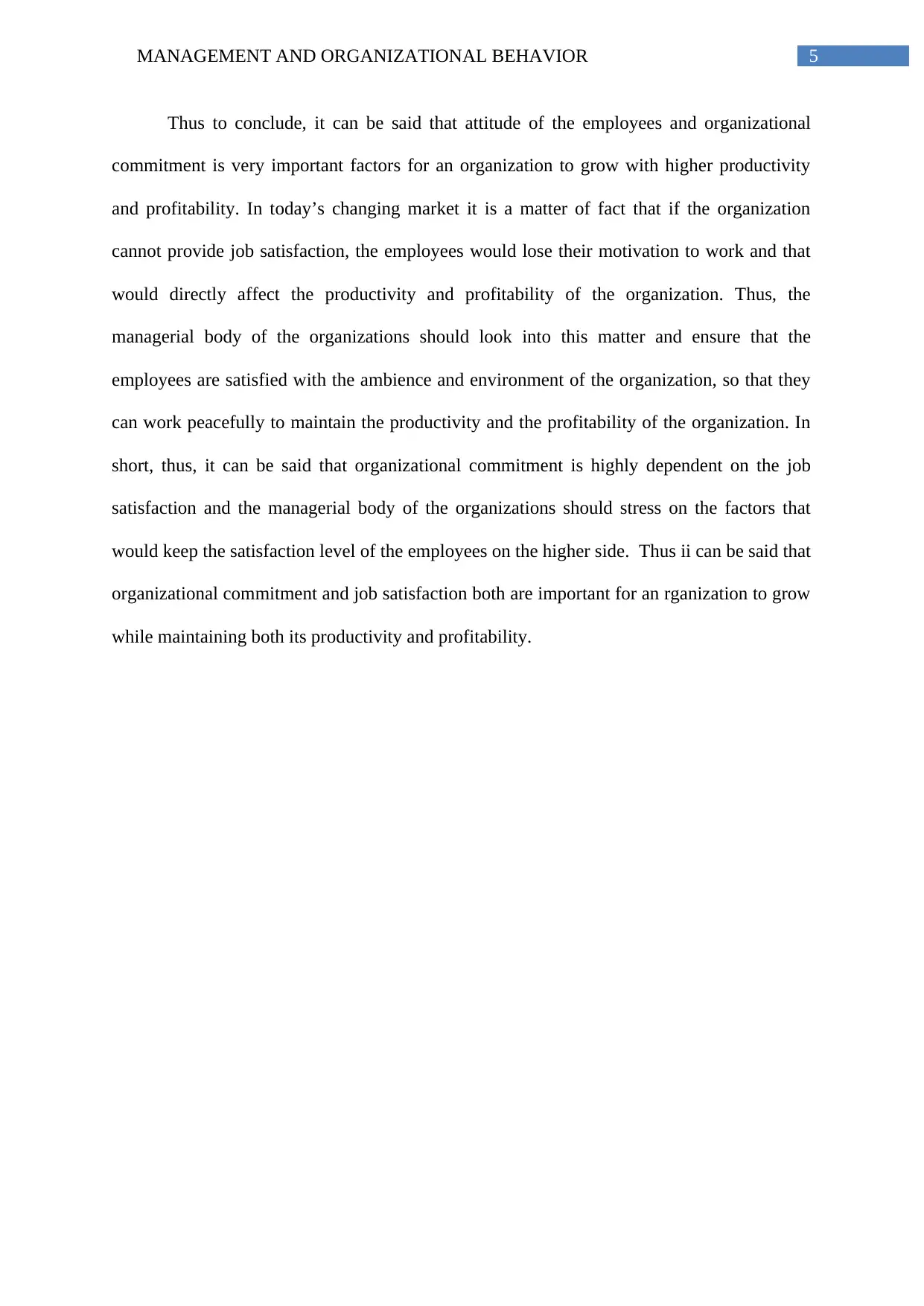
5MANAGEMENT AND ORGANIZATIONAL BEHAVIOR
Thus to conclude, it can be said that attitude of the employees and organizational
commitment is very important factors for an organization to grow with higher productivity
and profitability. In today’s changing market it is a matter of fact that if the organization
cannot provide job satisfaction, the employees would lose their motivation to work and that
would directly affect the productivity and profitability of the organization. Thus, the
managerial body of the organizations should look into this matter and ensure that the
employees are satisfied with the ambience and environment of the organization, so that they
can work peacefully to maintain the productivity and the profitability of the organization. In
short, thus, it can be said that organizational commitment is highly dependent on the job
satisfaction and the managerial body of the organizations should stress on the factors that
would keep the satisfaction level of the employees on the higher side. Thus ii can be said that
organizational commitment and job satisfaction both are important for an rganization to grow
while maintaining both its productivity and profitability.
Thus to conclude, it can be said that attitude of the employees and organizational
commitment is very important factors for an organization to grow with higher productivity
and profitability. In today’s changing market it is a matter of fact that if the organization
cannot provide job satisfaction, the employees would lose their motivation to work and that
would directly affect the productivity and profitability of the organization. Thus, the
managerial body of the organizations should look into this matter and ensure that the
employees are satisfied with the ambience and environment of the organization, so that they
can work peacefully to maintain the productivity and the profitability of the organization. In
short, thus, it can be said that organizational commitment is highly dependent on the job
satisfaction and the managerial body of the organizations should stress on the factors that
would keep the satisfaction level of the employees on the higher side. Thus ii can be said that
organizational commitment and job satisfaction both are important for an rganization to grow
while maintaining both its productivity and profitability.
⊘ This is a preview!⊘
Do you want full access?
Subscribe today to unlock all pages.

Trusted by 1+ million students worldwide
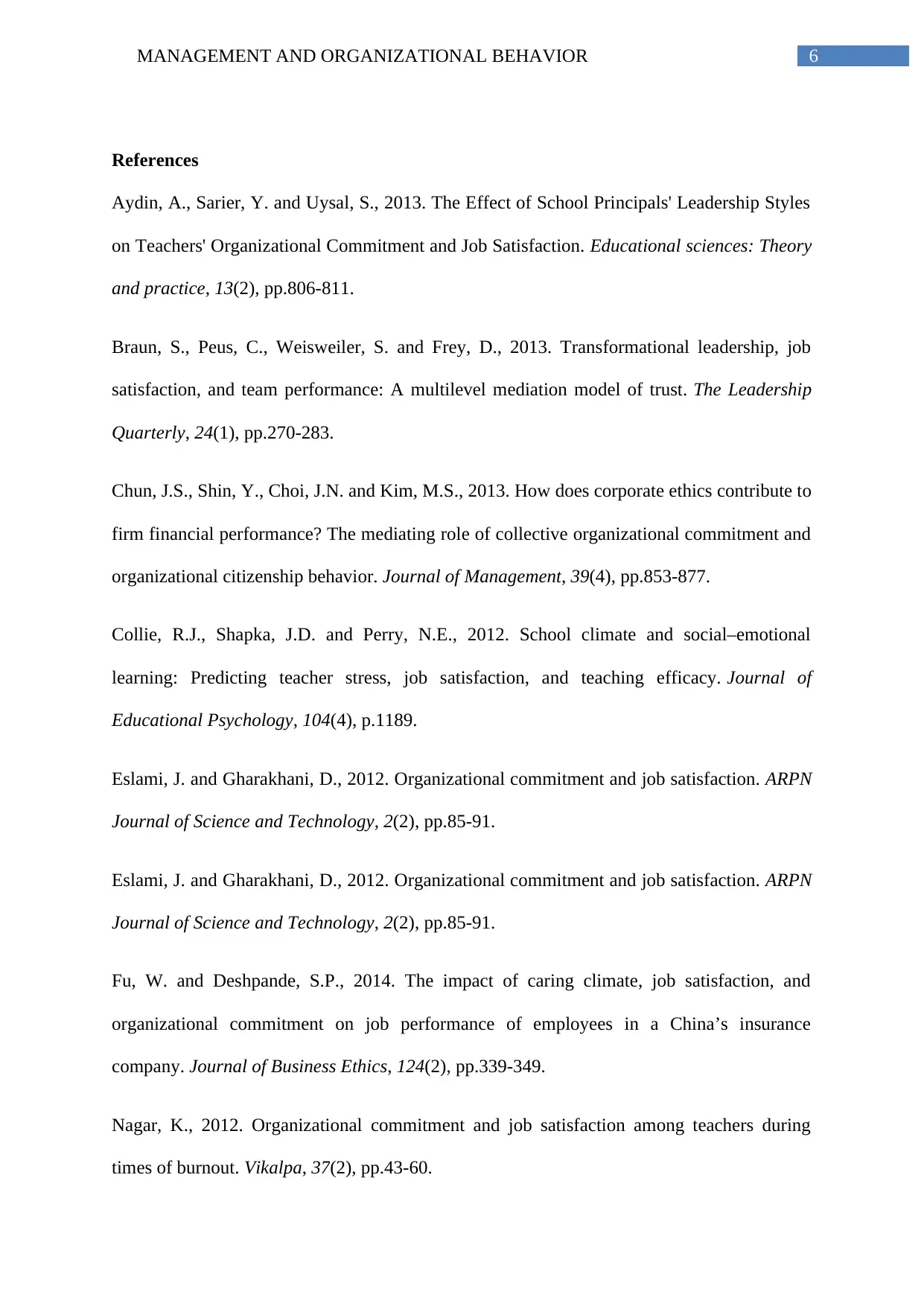
6MANAGEMENT AND ORGANIZATIONAL BEHAVIOR
References
Aydin, A., Sarier, Y. and Uysal, S., 2013. The Effect of School Principals' Leadership Styles
on Teachers' Organizational Commitment and Job Satisfaction. Educational sciences: Theory
and practice, 13(2), pp.806-811.
Braun, S., Peus, C., Weisweiler, S. and Frey, D., 2013. Transformational leadership, job
satisfaction, and team performance: A multilevel mediation model of trust. The Leadership
Quarterly, 24(1), pp.270-283.
Chun, J.S., Shin, Y., Choi, J.N. and Kim, M.S., 2013. How does corporate ethics contribute to
firm financial performance? The mediating role of collective organizational commitment and
organizational citizenship behavior. Journal of Management, 39(4), pp.853-877.
Collie, R.J., Shapka, J.D. and Perry, N.E., 2012. School climate and social–emotional
learning: Predicting teacher stress, job satisfaction, and teaching efficacy. Journal of
Educational Psychology, 104(4), p.1189.
Eslami, J. and Gharakhani, D., 2012. Organizational commitment and job satisfaction. ARPN
Journal of Science and Technology, 2(2), pp.85-91.
Eslami, J. and Gharakhani, D., 2012. Organizational commitment and job satisfaction. ARPN
Journal of Science and Technology, 2(2), pp.85-91.
Fu, W. and Deshpande, S.P., 2014. The impact of caring climate, job satisfaction, and
organizational commitment on job performance of employees in a China’s insurance
company. Journal of Business Ethics, 124(2), pp.339-349.
Nagar, K., 2012. Organizational commitment and job satisfaction among teachers during
times of burnout. Vikalpa, 37(2), pp.43-60.
References
Aydin, A., Sarier, Y. and Uysal, S., 2013. The Effect of School Principals' Leadership Styles
on Teachers' Organizational Commitment and Job Satisfaction. Educational sciences: Theory
and practice, 13(2), pp.806-811.
Braun, S., Peus, C., Weisweiler, S. and Frey, D., 2013. Transformational leadership, job
satisfaction, and team performance: A multilevel mediation model of trust. The Leadership
Quarterly, 24(1), pp.270-283.
Chun, J.S., Shin, Y., Choi, J.N. and Kim, M.S., 2013. How does corporate ethics contribute to
firm financial performance? The mediating role of collective organizational commitment and
organizational citizenship behavior. Journal of Management, 39(4), pp.853-877.
Collie, R.J., Shapka, J.D. and Perry, N.E., 2012. School climate and social–emotional
learning: Predicting teacher stress, job satisfaction, and teaching efficacy. Journal of
Educational Psychology, 104(4), p.1189.
Eslami, J. and Gharakhani, D., 2012. Organizational commitment and job satisfaction. ARPN
Journal of Science and Technology, 2(2), pp.85-91.
Eslami, J. and Gharakhani, D., 2012. Organizational commitment and job satisfaction. ARPN
Journal of Science and Technology, 2(2), pp.85-91.
Fu, W. and Deshpande, S.P., 2014. The impact of caring climate, job satisfaction, and
organizational commitment on job performance of employees in a China’s insurance
company. Journal of Business Ethics, 124(2), pp.339-349.
Nagar, K., 2012. Organizational commitment and job satisfaction among teachers during
times of burnout. Vikalpa, 37(2), pp.43-60.
Paraphrase This Document
Need a fresh take? Get an instant paraphrase of this document with our AI Paraphraser
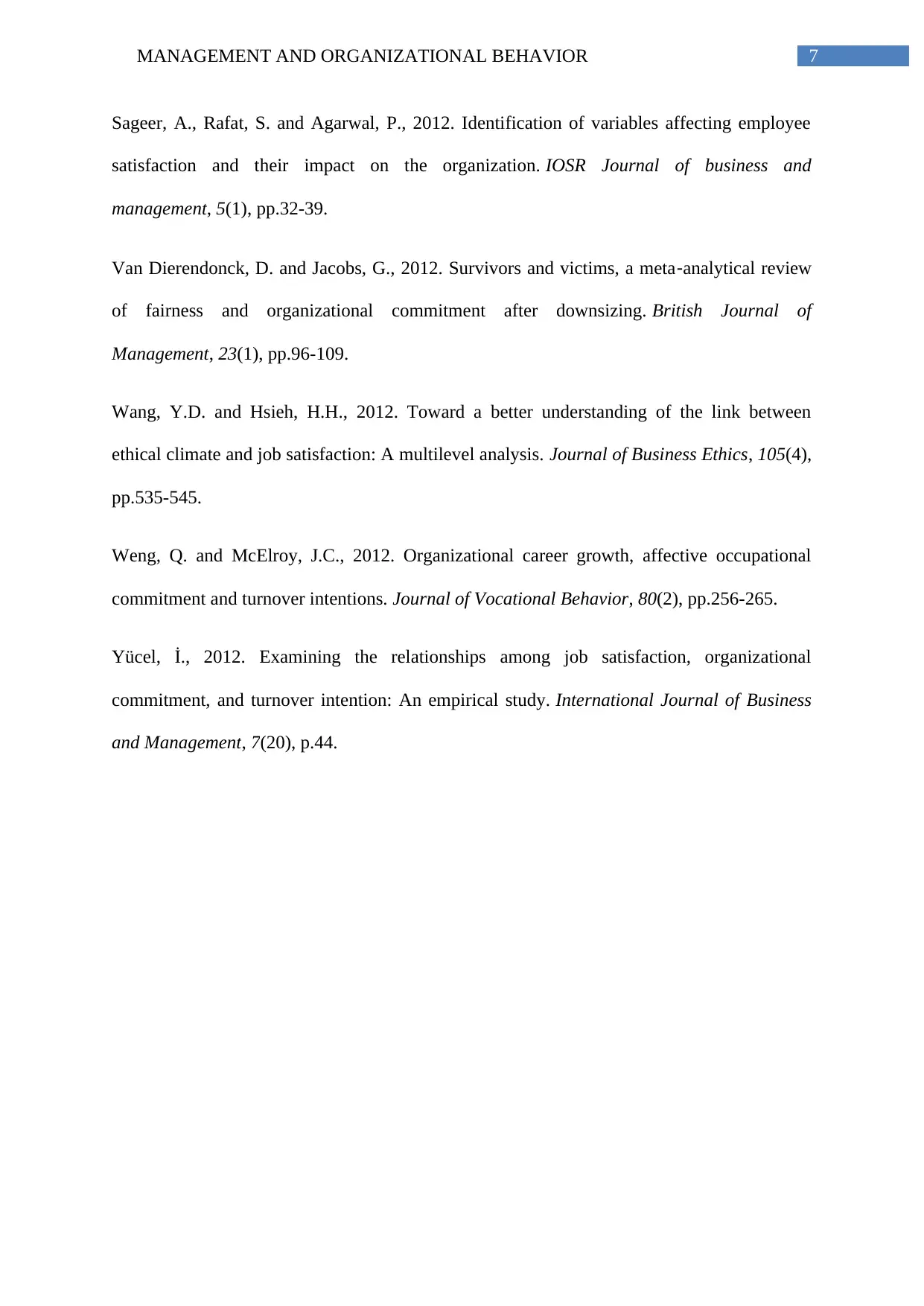
7MANAGEMENT AND ORGANIZATIONAL BEHAVIOR
Sageer, A., Rafat, S. and Agarwal, P., 2012. Identification of variables affecting employee
satisfaction and their impact on the organization. IOSR Journal of business and
management, 5(1), pp.32-39.
Van Dierendonck, D. and Jacobs, G., 2012. Survivors and victims, a meta‐analytical review
of fairness and organizational commitment after downsizing. British Journal of
Management, 23(1), pp.96-109.
Wang, Y.D. and Hsieh, H.H., 2012. Toward a better understanding of the link between
ethical climate and job satisfaction: A multilevel analysis. Journal of Business Ethics, 105(4),
pp.535-545.
Weng, Q. and McElroy, J.C., 2012. Organizational career growth, affective occupational
commitment and turnover intentions. Journal of Vocational Behavior, 80(2), pp.256-265.
Yücel, İ., 2012. Examining the relationships among job satisfaction, organizational
commitment, and turnover intention: An empirical study. International Journal of Business
and Management, 7(20), p.44.
Sageer, A., Rafat, S. and Agarwal, P., 2012. Identification of variables affecting employee
satisfaction and their impact on the organization. IOSR Journal of business and
management, 5(1), pp.32-39.
Van Dierendonck, D. and Jacobs, G., 2012. Survivors and victims, a meta‐analytical review
of fairness and organizational commitment after downsizing. British Journal of
Management, 23(1), pp.96-109.
Wang, Y.D. and Hsieh, H.H., 2012. Toward a better understanding of the link between
ethical climate and job satisfaction: A multilevel analysis. Journal of Business Ethics, 105(4),
pp.535-545.
Weng, Q. and McElroy, J.C., 2012. Organizational career growth, affective occupational
commitment and turnover intentions. Journal of Vocational Behavior, 80(2), pp.256-265.
Yücel, İ., 2012. Examining the relationships among job satisfaction, organizational
commitment, and turnover intention: An empirical study. International Journal of Business
and Management, 7(20), p.44.
1 out of 8
Related Documents
Your All-in-One AI-Powered Toolkit for Academic Success.
+13062052269
info@desklib.com
Available 24*7 on WhatsApp / Email
![[object Object]](/_next/static/media/star-bottom.7253800d.svg)
Unlock your academic potential
Copyright © 2020–2026 A2Z Services. All Rights Reserved. Developed and managed by ZUCOL.





